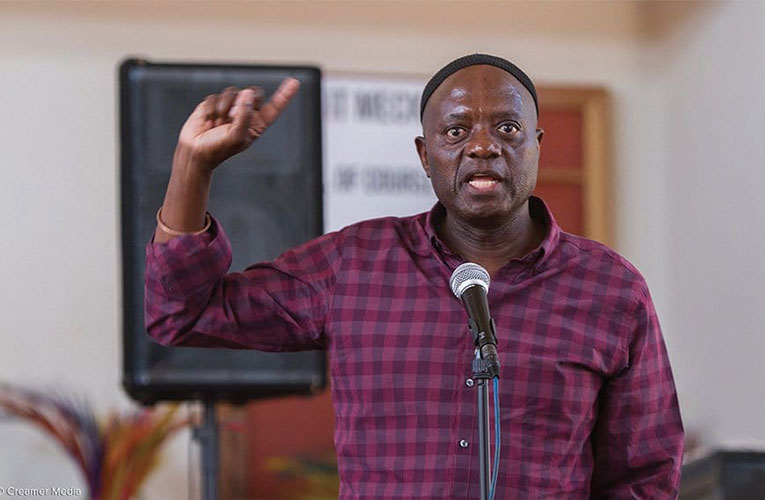Tribute to playwright, activist and poet Maishe Maponya, who has passed on
By Edward Tsumele
Mashe Maponya, poet and playwright has died. Maponya died this week after being ill for a long time, according to friends.
“Maishe Maponya … a comrade, activist, poet, playwright, writer, performer and my dear dear friend has died after a long illness
RIP brother,” Gather Pather a close friend of his wrote on Facebook yesterday.No further details were divulged yesterday in relation to Maponya’s circumstances surrounding his death.
Maponya an activist of note, a prolific writer of plays and an academic. He was one of a generation of black South Africa artists whose political orientation was based on the philosophy of Black pride without an apology, values shared by fallen artists such as fellow poet and playwright Matsemela Manaka.
Maponya is one of the prominent people who contributed to the fight for freedom in South Africa using the weapon they knew best, the arts to fight the apartheid system. However after freedom was attained, Maponya alongside a few others seems to have been eluded by the fruits of freedom . As many from his generation of activist artists found themselves in relatively comfortable spaces in corridors of power in a free South Africa, Maponya seemed to have been left out in the cold by the system. However he has had short-lived stints in the post apartheid system of government in South Africa before complications ensued, and the system throwing him out in his complicated relationship with it.
It is unclear what exactly Maponya was doing professionally at the time of his death, announced by friends on face book, but besides teaching stints at Wits School of the Arts, Maponya seemed not have held a solid job in the new South Africa for any length period of time, despite his advanced educational qualifications, including holding a masters degree in Arts from Leeds University in the UK.
However there was once a time when the system absorbed him into its job market, for example, as Director of Arts, Culture and Heritage for the City of Johannesburg from 2001 to 2003. However that did not last long as sooner he was thrown out by the system. Till this day it is unclear what really happened to him in that job, except that he was known to have been bitter about his loss of what must have been the most senior position he had ever held in government post 1994. Maponya was simply not meant to benefit from government cushy jobs it seems, unlike some of his arts contemporaries and former cultural activists who found themselves holding cushy public service jobs or being absorbed by academia as tenured lecturing staff in a free South Africa
Funny enough his theatre track record too seems to have been more glowing pre-apartheid than in a free country as his work was a regular feature on theatre stages both in South Africa And abroad, notably in the UK and in the US. He was awarded the Standard Bank Young Artist Award in 1985 and Wesley Guild’s Best Diepkloof Poet prize, 1986.
He was born Isaiah Maishe Maponya, the son of a painter in Alexandra township. When Maishe was 11, the family was forcibly removed to Diepkloof under the Apartheid laws. He became an insurance clerk and began writing for the theatre in 1975.
He completed a masters degree in Theatre Studies at Leeds University and became a lecturer at the University of the Witwatersrand Drama Department in the 1990s.
In 2001 he was appointed Director of Arts and Culture, with the City of Johannesburg, a short-lived stint that did not end well for him.
Maponya write serious political theatre, and called his plays “theatre of the dispossessed”, believing that theatre is one of the most dynamic ways of raising the consciousness of Black people in South Africa.
In 1975 he founded the Bahumutsi Drama Group of Soweto, thenceforth writing and producing his plays for them. During the 1980s the plays were also performed at the Market Theatre, and in 1983 The Hungry Earth played at the National Theatre in London as a platform performance , and subsequently toured Britain and Germany along with Umangikazi. Harrassed and intimidated by security police during the Apartheid years, he was refused a passport in 1984 to accompany his plays abroad.
To date his plays include The The Cry (1975), Peace and Forgive (1977), The Hungry Earth (written and produced 1979, published 1981, 1984), Umongikazi: The Nurse (The Nurse) (1982), Dirty Work (1984, published 1995),Gangsters (performed 1984, published 1986), Busang Meropa (1986) and Return the Drum,J ika.
Besides often directing his own work, he also directed plays by other writers, such as by Trevor Rhone’s Two Can Play (1992) and in 2008 Place of the Rock – How The Land Was Taken (a one man play, based on the writings of Sol T. Plaatje).
And so it is a curious situation that a man of such a brilliant theatre mind and endowed with intellectual inclination did not find space to express himself fully on the several theatre stages that now exist in South Africa, and yet ironically he had better opportunities in the dark days of apartheid South Africa r to do so. It feels like the country has been robbed of a theatre mind, that had not yet been fully exhausted. Funeral arrangements have not yet been announced by the family. May his soul rest in peace.










